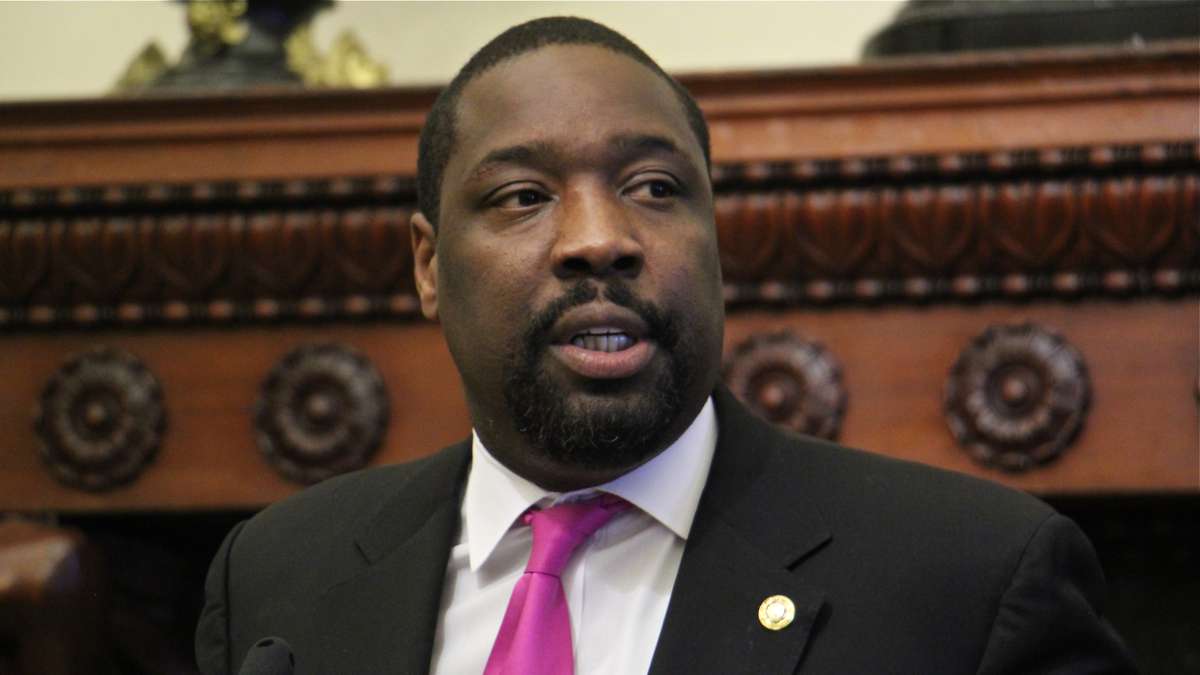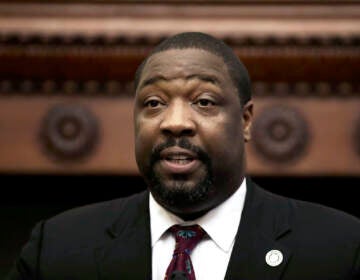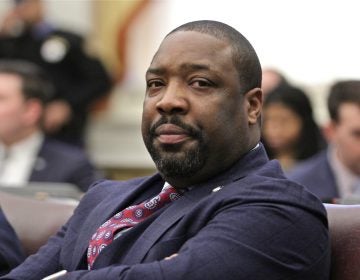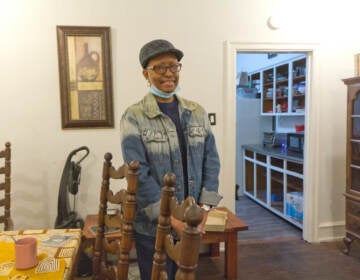Kenyatta Johnson’s wife takes center stage as prosecutors wrap second week of bribery trial
Prosecutors say Dawn Chavous’ consulting firm was used to conceal payments to her husband. And that she did little work for the nonprofit.

File photo: City Councilmember Kenyatta Johnson. (Emma Lee/WHYY)
It was a jam-packed day of testimony in the federal bribery trial of Philadelphia City Councilmember Kenyatta Johnson, with jurors briefly hearing from a total of five witnesses, including outgoing school Superintendent William Hite.
Many of the government’s questions were about Johnson’s wife and co-defendant Dawn Chavous. Prosecutors say Universal Companies used her consulting firm to conceal nearly $67,000 in bribes to her husband. And that Chavous did little work for the nonprofit to prove otherwise.
Penny Nixon, CEO of Universal’s charter schools, told the jury she wasn’t aware of any funds Chavous raised for the company, and that she never saw any work product from her, including any grant-related paperwork.
Nixon said another consultant at Universal helped her submit applications for public dollars.
Defense attorney Barry Gross, who represents Chavous, pointed out that his client was never on Nixon’s team — that she reported directly to co-defendant and former Universal CEO Abdur Rahim Islam, as did several other consultants for the organization. He also presented emails addressed to Nixon and Chavous, including a message related to securing new funding for Universal, an ongoing objective for the nonprofit.
Johnson’s attorney, Patrick Egan, said Universal hired Chavous because the company knew she had connections to public officials, as well as well-heeled institutions and wealthy individuals who supported charter schools. Universal executives hoped those connections could bring in cash for the organization, he said.
“There are two kinds of charter schools — the haves and the have-nots,” said Egan. “Obviously, the haves get more funding than the have-nots. And they get a lot more private funding than the have-nots.”
Prosecutors also discussed Chavous with former FBI Special Agent Robert McManigal, who interviewed former Universal CEO Abdur Rahim Islam and former Universal CFO Dawan Shahied, who are charged alongside Johnson and his wife.
During a 2017 interview with Dawan at his home in Philadelphia, McManigal said the executive told federal investigators he believed Chavous “did some function in grant writing or fundraising” and that he may have even written her contract with the company.
But when McManigal asked for specifics, Dawan couldn’t oblige. “He couldn’t give us any examples of what it is that she did.”
Islam, questioned the same morning, described Chavous as an education specialist who was “pretty well connected” to the principals of an investment firm who had spent millions supporting charter schools.
“At some point later, he indicated that she may have introduced them to Joel Greenberg,” said McManigal, referring to a co-founder of the Susquehanna International Group.
“Did he identify anything else?” said Assistant U.S. Attorney Eric Gibson.
“No,” said the former agent.
During the same interview, completed in two parts, Islam told investigators that he terminated Chavous’ contract in 2014 because she failed to raise any funds for Universal, according to the agents.
By then, she’d been under contract for well over a year. But Islam said there wasn’t any quid pro quo.
“He said he was never asked to hire Mrs. Chavous in exchange for anything,” said Gross while cross-examining McManigal.
Lawyers on Friday briefly questioned Hite, who is leaving the district after 10 years on the job, about his professional relationships with Chavous and Islam, who both had his personal cell phone.
They also called affordable housing developer Richard Barnhart to the stand. He loaned Islam $25,000 in April 2013 after the former executive told him he was in a “tough spot” because he had a sick kid.
Universal was allegedly cash-strapped around that time.
Islam never repaid the loan, but Barnhart said he never expected that to happen.
Earlier in the day, defense lawyers worked to discount testimony from a neighbor who led opposition to a 2014 proposal to bring a mixed-use development to the site of the historic Royal Theater on South Street, then a vacant and decaying eyesore along the commercial corridor.
In exchange for the alleged bribe money, prosecutors say Johnson helped Universal maintain control of valuable real estate in his legislative district, including the theater, which needed new zoning to move forward with its redevelopment plans.
Johnson introduced zoning legislation that took care of that hurdle.
While questioning Deena Kobell, who has lived directly behind the Royal on Kater Street since 2010, Islam attorney Joshua Hill noted that the Universal project had support from the area’s most prominent civic and business association — the South of South Neighborhood Association and the South Street West Business Association.
At one SOSNA meeting, 30 neighbors voted in favor of the redevelopment, while only eight opposed it, including Kobel, who formed a group to represent the interests of neighbors on Kater Street who had concerns about the project’s design, including the setback on Kater, a parking garage entrance and balconies planned for the backside of the theater.
Hill also highlighted that just one neighbor spoke against the redevelopment during a City Council hearing for legislation Johnson introduced to rezone the Royal so Universal could move forward with its plans.

Subscribe to PlanPhilly
WHYY is your source for fact-based, in-depth journalism and information. As a nonprofit organization, we rely on financial support from readers like you. Please give today.







